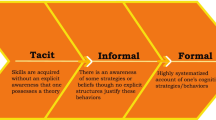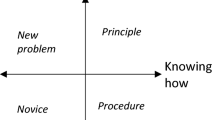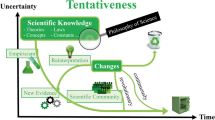Abstract
Students at all ages hold a wide variety of scientifically faulty knowledge structures called “misconceptions”. As far as misconceptions in chemistry are concerned, college science students are no exception. Systematic administration to freshman biology majors of specially-designed mid-term and term higher-order cognitive skills (HOCS)-oriented examinations within the courses “General and Inorganic Chemistry” and “Introduction to Modern Organic Chemistry” proved these examinations to be very effective in revealing and distinguishing between students'misconceptions, misunderstandings, and“no conceptions”. Several of these have never been mentioned before in the relevant research literature. Accordingly, reflective teaching strategies to overcome this “misconceptions problem” and affect meaningfully subsequent learning have been explored and implemented within our longitudinal effort to develop students' HOCS. The study results combined with accumulated experience indicate that properly designed HOCS-oriented examinations may be very effective for revealing, but notper se for overcoming, students' misconceptions. However, within HOCS-oriented chemistry teaching, the assessment of students by such examinations is very useful particularly for providing data for remediation purposes via appropriate modification of the teaching strategies. Eventually, this leads to gains in students' HOCS which is in line with the overall goal of the current reform in science education.
Similar content being viewed by others
References
Abraham, M. R., Crzybowski, E. B., Renner, J. W. & Marek, E. A. (1992). Understanding and misunderstanding of eighth graders of five chemistry concepts found in textbooks.Journal of Research in Science Teaching, 29(2), 105–120.
Adey, P., & Shayer, M. (1994).Really raising standards. Hants: Routledge.
Anderson, R. D., Anderson, B. L., Varanka-Martin, M. A., Romagnano, L., Bielenberg, J., Flory, M., Mieras, B., & Whitworth, J. (1994).Issues of curriculum in science, mathematics and higher order thinking across the disciplines. Washington, DC: U.S. Department of Education, Office of Research.
Breen, T. J., Baxter, G. P., Glaser, R., & Raghavan, K. (1994, March).Assessment of higher order thinking skills: Evidence from selected state testing programs. Paper presented at the annual meeting of National Association for Research in Science Teaching, Anaheim, CA.
Dunbar, S.B., Koretz, D. M., & Hoover, H. D. (1991). Quality control in the development and use of performance assessments.Applied Measurements in Education, 4(4), 289–305.
Gilbert, J. K. Osborne, R. J., & Fensham, P. J. (1982). Children's science and its consequences for teaching.Science Education, 66(4), 623–633.
Glaser, R., & Baxter, G.P. (1994, March).A cognitive framework for evaluating innovative science assessments. Paper presented at the annual meeting for National Association of Research in Science Teaching, Anaheim, CA.
Griffith, A. K., Thomey, K., Cooke, B., & Normore, G. (1988). Remediation of student-specific misconceptions related to three science concepts.Journal of Research in Science Teaching, 25(9), 709–719.
Gussarsky, E., & Gorodetsky, M. (1990). On the concept “Chemical Equilibrium”: The association framework.Journal of Research in Science Teaching, 27(3), 197–204.
Hills, F. L. C. (1989). Students' “untutored beliefs” about natural phenomena: Primitive science or common sense?Science Education, 73(2), 155–186.
Jorgensen, M. (1993).Assessing habits of mind: Performance-based assessment in science and mathematics. Columbus OH: ERIC Clearinghouse for Science, Mathematics, and Science Education.
Kempa, R.F. (1988). Students' learning difficulties in science. In R.F. Kempa, R. Ben Zvi, A. Hofstein, I., & Cohen (Eds.),Learning difficulties in chemistry (pp. 11–32). Proceedings of a Bi-National U.K.-Israel Seminar, Jerusalem, Israel.
Kulm, G., & Malcolm, S.M. (Eds.). (1991).Science assessment in the service of reform. Washington, DC: American Association for the Advancement of Science.
Lawson, A. E., & Thompson, L. D. (1988). Formal reasoning ability and misconceptions concerning genetics and natural selection.Journal of Research in Science Teaching, 25(9), 733–746.
Lohman, D. E. (1993). Teaching and testing to develop fluid abilities.Educational Researcher, 22(7), 12–23.
Mitchell, R. (1992).Testing for learning: How new approaches to evaluation can improve American schools. New York: The Free Press.
Muthukrishna, N., Carnine, D., Grossen, B., & Miller, S. (1993). Children's alternative frameworks: Should they be directly addressed in science instruction?Journal of Research in Science Teaching, 30(3), 233–248.
Nakhleh, M. B. (1993). Are our students conceptual thinkers or algorithmic problem solvers?Journal of Chemical Education, 70(1), 52–55.
Nakhleh, M. B., & Mitchell, R. C. (1993). Concept learning versus problem solving.Journal of Chemical Education, 70(3), 190–192.
Niaz, M. (1994). Enhancing thinking skills: Domain specific domain general strategies—A dilemma for science education.Instructional Science, 2, 1–10.
Novak J. D., & Mitchell, R. C. (Eds.). (1987).Proceedings of the Second International Seminar on Misconceptions and Educational Strategies in Science and Mathematics, Ithaca, NY.
Novak, J.D., & Wandersee, J. H. (Eds.). (1990). Special issue: Perspectives on concept mapping.Journal of Research in Science Teaching,27(10).
Raudenbush, S. W., Rowan, B., & Cheong, Y. F. (1993). Higher-order instructional goals in secondary schools: Class, teacher and school influences.American Research Journal, 30(3), 523–555.
Schmidt, H. J. & Beine, M. (1992). Setting multiple choice test.Education in Chemistry, January, 19–21.
Shavelson, R. J., Baxter, P., & Gao, X. (1993). Sampling variability of performance assessments.Journal of Educational Measurement, 30(4), 215–232.
Smith, E. L., Blakeslee, T. D., & Anderson, C. W. (1993). Teaching strategies associated with conceptual change learning in science.Journal of Research in Science Teaching, 30(2), 111–126.
Solomon, G., & Perkins, D. (1989). Rocky roads to transfer: Rethinking mechanisms of a neglected phenomenon.Educational Psychologist, 24(2), 113–142.
Strike, K. A., & Posner, G. J. (1985). A conceptual change view of learning and understanding. In L. H. T. West & A. L. Pines (Eds.),Cognitive structure and conceptual change. New York: Academic Press.
Yeany, R. H., & Miller, P. A. (1983). Effects of diagnostic/remedial instruction on science learning: A meta analysis.Journal of Research in Science Teaching, 20(1), 19–26.
Zoller, U. (1987). The fostering of Question-Asking capability-A meaningful aspect of problem-solving in chemistry.Journal of Chemical Education, 64(6), 510–512.
Zoller, U. (1990a). Students' misunderstandings and misconceptions in college freshman chemistry (general and organic).Journal of Research in Science Teaching, 27(10), 1053–1065.
Zoller, U. (1990b). The IEE-an STS approach.Journal of College Science Teaching, 19(5), 289–291.
Zoller, U. (1991). Teaching/Learning Styles, performance, and students' teaching evaluating in S/T/E/S-focussed science education. A quasi-quantitative probe of a case study.Journal of Research in Science Teaching, 28(7), 593–607.
Zoller, U. (1993). Are lecture and learning compatible? Maybe for LOCS: Unlikely for HOCS.Journal of Chemical Education, 70(3), 195–197.
Zoller, U. (1994). The examination where the student asks the questions.School Science and Mathematics, 94(7), 347–349.
Zoller, U., Nakhleh, M. B., Dori, Y. J., Lubezky, A., & Tessier, B. (1996). Success on algorithmic and LOCS vs. conceptual chemistry exam questions.Journal of Chemical Education, 72(11), 987–989.
Zoller, U., Dori, Y. J., & Lubezki, A. (submitted). Algorithmic and LOCS vs HOCS(chemistry) exam questions: Performance and Attitudes of College Students.Journal of Research in Science Teaching.
Author information
Authors and Affiliations
Rights and permissions
About this article
Cite this article
Zoller, U. The use of examinations for revealing and distinguishing between students' misconceptions, misunderstandings and “no conceptions” in college chemistry. Research in Science Education 26, 317–326 (1996). https://doi.org/10.1007/BF02356942
Issue Date:
DOI: https://doi.org/10.1007/BF02356942




